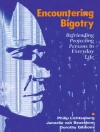People in groups act aggressively as a group, not as a collection
of individuals. The Psychology of Group Aggression’s comprehensive
journey starts with group dynamics theory and research by reviewing
its relationship to aggression.
Arnold P. Goldstein then provides a unique and valuable insight
into the different types and levels of intensity of anti-social
behavior, examines its causes and considers its costs. In separate
chapters he considers low intensity aggression, including
ostracism, hazing, teasing; mid-intensity, e.g. bullying,
harassment; and high intensity aggression e.g. mobs and gangs. In a
final section, he considers management and intervention techniques,
both those widely employed and emerging methods.
An important work for both a pure and an applied audience, this
will be a key reference for many, including clinical and forensic
psychologists, psychiatrists, criminal justice workers, social
psychologists and academics and students in criminology, psychology
and sociology.
Published in the Wiley Series in Forensic Clinical Psychology
Series Editors:
Professor Clive Hollin, University of Leicester, UK
and Dr Mary Mc Murran, Cardiff University, UK
Зміст
About the Author.
Series Editors’ Preface.
Preface.
PART I: INTRODUCTION.
Aggression-Relevant Group Dynamics.
PART II: FORMS AND FORMULATIONS.
Low-Level Aggression
Bullying and Harassment
Delinquent Gangs
The Mob
PART III: INTERVENTION.
Established and Emerging Interventions.
References.
Index.
Про автора
Arnold P. Goldstein was the Director of the Center for Research on Aggression at Syracuse University, Director of the New York State Task Force on Juvenile Gangs, and co-founder of the International Center for Aggression Replacement Training. He served on the American Psychological Association Commission on Youth Violence and on the Council of Representatives for the International Society for Research on Aggression. A prolific writer, he authored more than 55 books and 100 articles on violence, aggression, delinquency, abuse, and related topics. His work was honored with numerous awards, including the Career Achievement Award from the American Psychological Association’s Committee on Children, Youth, and Families, the Senior Scientist Award from the APA Psychology Division, and the 2002 Devereux Massachusetts Legacy of Caring Award. Just before his death in 2002, Professor Goldstein was nominated for a Nobel Prize.












